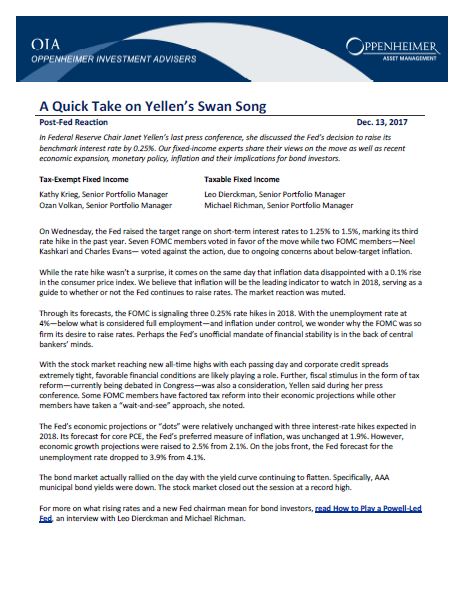A Quick Take on Yellen's Swan Song
Post-Fed Reaction
In Federal Reserve Chair Janet Yellen’s last press conference, she discussed the Fed’s decision to raise its benchmark interest rate by 0.25%. Our fixed-income experts share their views on the move as well as recent economic expansion, monetary policy, inflation and their implications for bond investors.
Tax-Exempt Fixed Income
Kathy Krieg, Senior Portfolio Manager
Ozan Volkan, Senior Portfolio Manager
Taxable Fixed Income
Leo Dierckman, Senior Portfolio Manager
Michael Richman, Senior Portfolio Manager
On Wednesday, the Fed raised the target range on short-term interest rates to 1.25% to 1.5%, marking its third rate hike in the past year. Seven FOMC members voted in favor of the move while two FOMC members—Neel Kashkari and Charles Evans— voted against the action, due to ongoing concerns about below-target inflation.
While the rate hike wasn’t a surprise, it comes on the same day that inflation data disappointed with a 0.1% rise in the consumer price index. We believe that inflation will be the leading indicator to watch in 2018, serving as a guide to whether or not the Fed continues to raise rates. The market reaction was muted.
Through its forecasts, the FOMC is signaling three 0.25% rate hikes in 2018. With the unemployment rate at 4%—below what is considered full employment—and inflation under control, we wonder why the FOMC was so firm its desire to raise rates. Perhaps the Fed’s unofficial mandate of financial stability is in the back of central bankers’ minds.
With the stock market reaching new all-time highs with each passing day and corporate credit spreads extremely tight, favorable financial conditions are likely playing a role. Further, fiscal stimulus in the form of tax reform—currently being debated in Congress—was also a consideration, Yellen said during her press conference. Some FOMC members have factored tax reform into their economic projections while other members have taken a “wait-and-see” approach, she noted.
The Fed’s economic projections or “dots” were relatively unchanged with three interest-rate hikes expected in 2018. Its forecast for core PCE, the Fed’s preferred measure of inflation, was unchanged at 1.9%. However, economic growth projections were raised to 2.5% from 2.1%. On the jobs front, the Fed forecast for the unemployment rate dropped to 3.9% from 4.1%.
The bond market actually rallied on the day with the yield curve continuing to flatten. Specifically, AAA municipal bond yields were down. The stock market closed out the session at a record high.
Disclaimer
© 2017 Oppenheimer Asset Management Inc. This commentary is intended for informational purposes only. The information and statistical data contained herein have been obtained from sources we believe to be reliable. Oppenheimer Investment Advisers (OIA) is a division of Oppenheimer Asset Management Inc. The opinions expressed are those of Oppenheimer Asset Management Inc. (“OAM”) and its affiliates
and are subject to change without notice. No part of this presentation may be reproduced in any manner without the written permission of OAM or any of its affiliates. Any securities discussed should not be construed as a recommendation to buy or sell and there is no guarantee that these securities will be held for a client’s account nor should it be assumed that they were or will be profitable.
Past performance does not guarantee future comparable results. Special Risks of Fixed Income Securities -there is a risk that the price of these securities will go down as interest rates rise. Another risk of fixed income securities is credit risk, which is the risk that an issuer of a bond will not be able to make principal and interest payments on time. Neither OAM nor its affiliates offer tax advice. OAM is a wholly owned subsidiary of Oppenheimer Holdings Inc. which also wholly owns Oppenheimer & Co. Inc. (“Oppenheimer”), a registered broker/dealer and investment adviser. Securities are offered through Oppenheimer and will not be insured by the FDIC or other similar deposit insurance, will not be deposits or other obligations of Oppenheimer or guaranteed by any bank or other financial institution, will not be endorsed or guaranteed by Oppenheimer and will be subject to investment risks, including the possible loss of principle invested. OIA121317CM1

